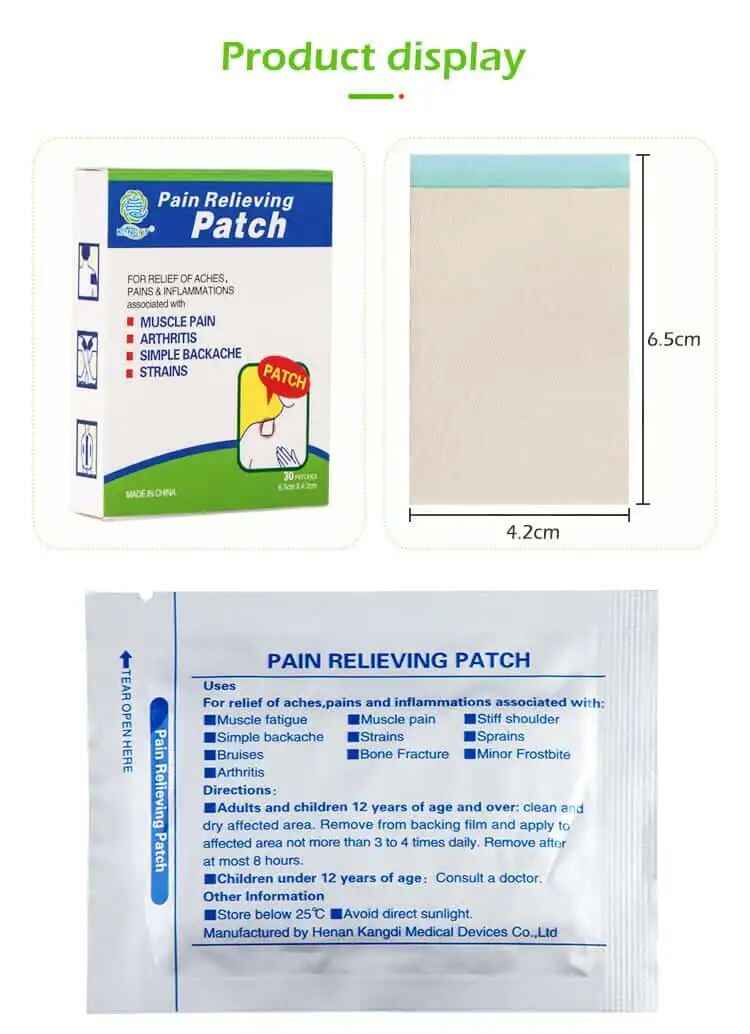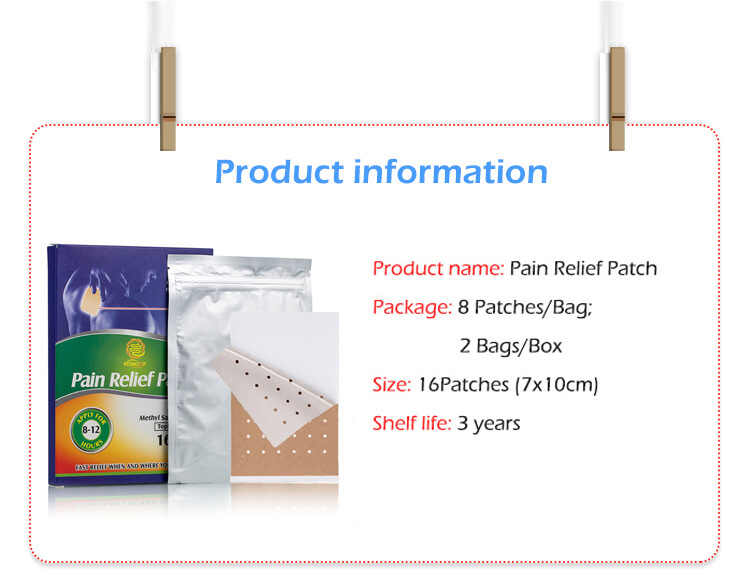What Makes a Good Chronic Pain Patches Supplier for International B2B Markets?
As global demand for non-invasive, fast-acting pain relief solutions continues to rise, Chronic Pain Patches have become a staple product for wellness brands, pharmacies, and health distributors. For businesses seeking to enter or expand in this niche, choosing the right Chronic Pain Patches Supplier is a critical decision—especially in the international B2B market where compliance, logistics, and customization determine success.

This article explores the core traits and capabilities that define a reliable Chronic Pain Patches Manufacturer or Chronic Pain Patches OEM partner. Whether you are a startup launching a Private Label Chronic Pain Patches brand or an established distributor seeking high-volume production of Custom Chronic Pain Patches, here’s what to look for when selecting your global supplier.
1. Global Regulatory Compliance and Certifications
A good Chronic Pain Patches Supplier must understand and comply with health regulations in various regions. Each country has its own set of standards, and failing to meet them can lead to customs rejections, product recalls, or legal penalties.
Key Certifications to Look For:
FDA (U.S. Food and Drug Administration)
CE Mark (European Economic Area)
ISO 13485 (Medical device quality management)
GMP (Good Manufacturing Practice)
TGA (Australia), NMPA (China), PMDA (Japan)
Why It Matters:
Choosing a certified Chronic Pain Patches OEM ensures that your products meet international safety, efficacy, and quality benchmarks. It also simplifies documentation for market entry.
2. Proven Export Experience and International Logistics Support
Supplying internationally involves more than manufacturing; it requires smooth cross-border fulfillment and documentation. A qualified Chronic Pain Patches Manufacturer should have:
Experience in shipping bulk orders to multiple countries
Established freight and customs clearance partnerships
Multilingual labeling and packaging capabilities
Understanding of import restrictions and duties
Why It Matters:
A supplier with international logistics expertise prevents costly delays, customs issues, and stock shortages for your overseas customers or retail partners.
3. Customization Capabilities for Local Market Needs
Each international market has unique preferences regarding formulation, ingredients, and even product design. For example:
Asian markets may favor herbal ingredients
European buyers may prioritize natural and vegan formulations
U.S. consumers often expect FDA-registered claims on packaging
A capable Chronic Pain Patches OEM offers flexible Custom Chronic Pain Patches options, including:
Patch size, strength, and duration
Active ingredients (menthol, capsaicin, CBD, etc.)
Scented vs. unscented varieties
Brand-specific private label packaging
4. Strong Private Label Capabilities
International businesses often seek Private Label Chronic Pain Patches to build their own brands without owning a manufacturing facility. A reliable supplier should offer:
End-to-end private labeling (product + packaging)
Graphic design services or packaging templates
Low minimum order quantities (MOQs) for market testing
Language translation and regulatory label compliance
Why It Matters:
A strong private label program allows international buyers to enter their markets quickly with products that look and feel fully branded—even at the pilot phase.
5. High-Quality Raw Materials and Transparency
The global trend toward clean-label, non-toxic, and eco-conscious products makes ingredient transparency non-negotiable. A responsible Chronic Pain Patches Manufacturer provides:
Ingredient traceability and safety data sheets (SDS)
Certificates of Analysis (COA) for raw materials
Allergen-free, cruelty-free, or vegan options
Transparent sourcing for herbal and pharmaceutical-grade compounds
Why It Matters:
Transparent sourcing builds brand credibility and avoids customer backlash or regulatory fines due to hidden or restricted substances.
6. Consistent Production Quality and Quality Control Systems
For long-term B2B success, a Chronic Pain Patches Supplier must maintain strict quality assurance protocols to ensure each batch meets the same standards.
Core QA/QC Measures:
In-process checks (adhesiveness, moisture retention, etc.)
Final inspection and lab testing of each batch
Stability testing under different climates
Use of clean rooms or ISO-standard production environments
Why It Matters:
B2B customers demand consistency. Quality issues can lead to lost contracts, product recalls, or reputational damage in foreign markets.
7. Responsive Communication and Multilingual Support
Effective and timely communication is crucial in B2B partnerships, especially across different time zones and languages. A high-performing Chronic Pain Patches Supplier should offer:
English-speaking account managers or multilingual teams
Fast response times (within 24–48 hours)
Clear documentation and timelines
Video calls, order tracking, and after-sales support
Why It Matters:
Efficient communication minimizes misunderstandings, accelerates approvals, and builds long-term trust with your international clients.
8. Scalable Manufacturing Capacity
A good Chronic Pain Patches OEM not only supports small trial orders but also has the infrastructure to scale up for large retail, pharmacy, or healthcare network orders.
Key Considerations:
Daily/weekly production volume capacity
Lead time for reorders and peak-season readiness
Ability to scale without compromising quality
Flexible MOQs for different regions
Why It Matters:
Growth-stage businesses often scale quickly. Your supplier should be able to keep pace without compromising delivery or product quality.
9. Research & Development for Product Innovation
Staying competitive in global markets means constantly improving. A forward-thinking Chronic Pain Patches Manufacturer invests in:
Novel ingredients (e.g., CBD, turmeric, magnesium)
Advanced delivery systems (nanotechnology, hydrogel)
Eco-friendly materials and zero-waste packaging
Clinical testing or product validation studies
Why It Matters:
Innovation helps your product stand out in saturated markets and win contracts with higher-end retailers or healthcare systems.
10. Case Studies, Testimonials, and Global References
Before finalizing a supplier, look for tangible proof of success. A reputable Chronic Pain Patches Supplier should provide:
Case studies of international clients
Third-party reviews or testimonials
Product samples and mockups
Photos or videos of facilities and packaging lines
Why It Matters:
Proof of past success gives confidence that the supplier can handle your needs and deliver as promised—especially when you’re not visiting them in person.
Conclusion: Building a Strategic International Partnership
In the competitive and regulatory-intensive world of international B2B healthcare, not all suppliers are created equal. The best Chronic Pain Patches Manufacturers distinguish themselves through:
Regulatory compliance
Customization expertise
Private label scalability
High-quality materials
Logistics and communication fluency
Whether you’re launching your first Private Label Chronic Pain Patches brand or expanding your retail line with Custom Chronic Pain Patches, choosing the right Chronic Pain Patches OEM is more than a procurement decision—it’s a strategic investment in your brand’s reputation, compliance, and scalability.
Related Questions and Answers
Q1: What should I check before choosing a Chronic Pain Patches Supplier?
A: Verify certifications, production capacity, customization options, logistics experience, and past international clients.
Q2: Why is regulatory compliance so important for international markets?
A: Non-compliance can result in customs delays, fines, or banned shipments, especially for health-related products.
Q3: Can I launch a Private Label Chronic Pain Patch brand with low order quantities?
A: Yes. Many top Chronic Pain Patches OEM partners offer low MOQs to help new businesses test the market.
Q4: What customization options are available in Custom Chronic Pain Patches?
A: You can customize ingredients, patch size, scent, release duration, packaging, and branding.
Q5: How do I know if a Chronic Pain Patches Manufacturer is trustworthy?
A: Look for ISO/FDA certifications, client references, third-party audits, and responsiveness in communication.






